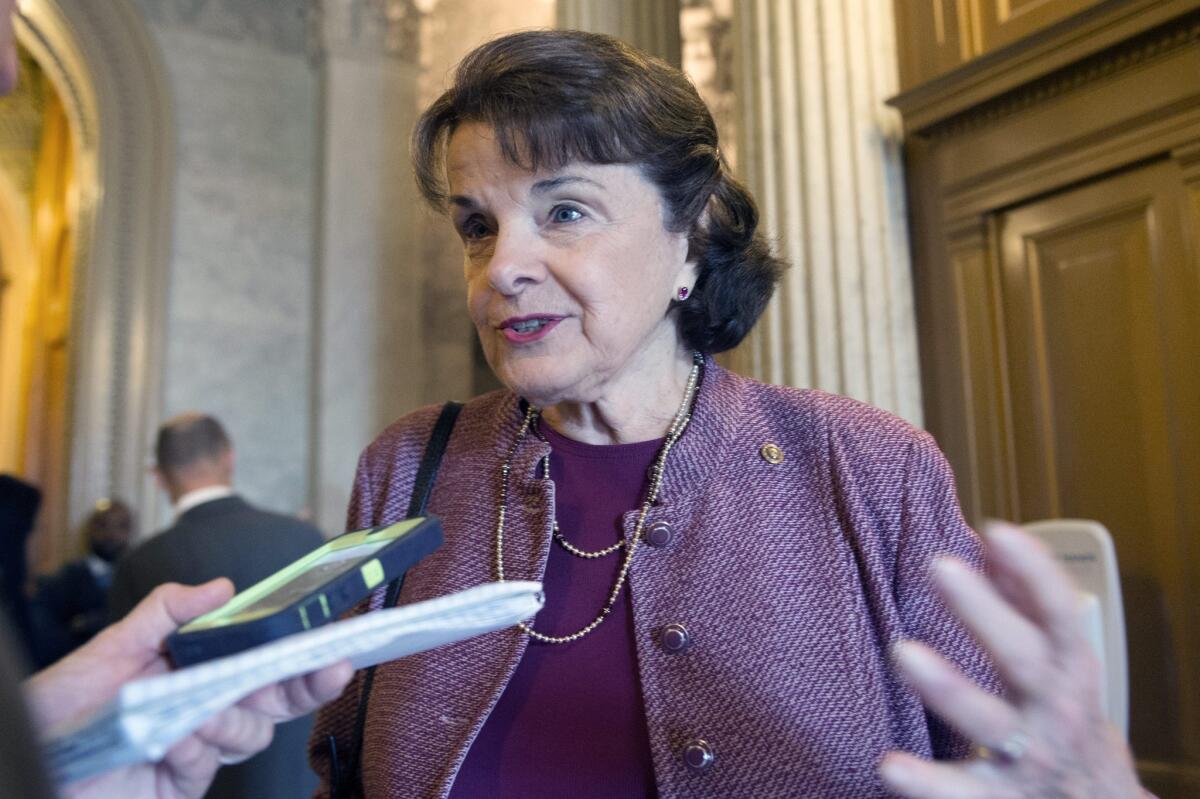Column: Dianne Feinstein steps up her war against Airbnb

Sen. Dianne Feinstein, sworn opponent of Airbnb, has injected herself into a contentious ballot campaign targeting the firm.
- Share via
The relationship between the home-sharing service Airbnb and San Francisco is a weird one, given that the city is its headquarters and also the source of some of its most determined neighborhood opposition. But among its most intriguing features is the war being waged on the firm by Sen. Dianne Feinstein (D-Calif.).
Feinstein’s latest salvo was an op-ed published Friday under her name by the San Francisco Chronicle, supporting a city measure on next month’s ballot that would tighten regulations on rentals via Airbnb and other such services.
City Hall handed over the keys to the city to Airbnb.
— Sen. Dianne Feinstein, D-Calif.
The measure is highly contentious: As of the end of September, Airbnb had contributed some $8 million to oppose it. It’s also sure to be closely watched in Los Angeles and other municipalities across the nation grappling with ways to manage the surge in short-term rentals, especially in neighborhoods that have traditionally housed long-term residents. Neighborhood activists in San Francisco and elsewhere fear that the rush to profit from short-term rentals will take long-term housing stock off the market, driving up rents and changing the character of otherwise stable communities.
In the Chronicle piece placed by the anti-Airbnb advocacy group ShareBetter SF, Feinstein wrote that Proposition F is needed because the home-sharing regulations enacted by Mayor Ed Lee and his allies are unenforceable. The existing rules cap sublets at 90 days a year, with no limit on rentals during which the host remains on hand. Critics say that’s a huge loophole, since it’s practically impossible to verify whether the host is home.
“City Hall let us down,” Feinstein’s piece says. “City Hall handed over the keys to the city to Airbnb.”
As it happens, the Chronicle itself has editorialized against Proposition F, chiefly because as a ballot measure it would be impossible to revise without another public vote as the home-sharing business evolves. The measure also is opposed by Mayor Lee and former Mayor Gavin Newsom, who is currently California Lt. Governor.
Something byzantine in local San Francisco politics may well be playing itself out through Feinstein’s position. While it may be unusual for a U.S. senator to inject herself into a very local controversy, she did serve on the San Francisco Board of Supervisors for nine years (1969-78) and as the city’s mayor for nine years after that. She has been in the Senate since 1992.
But this isn’t her first salvo against Airbnb. Last October, she wrote an op-ed in the Chronicle in the same vein, calling the city’s regulations shortsighted and raising the specter of “a blanket commercialization of our neighborhoods” that would raise already “sky-high rental costs higher.”
Airbnb implied that Feinstein’s opposition derives from the personal business interests of herself and her husband, investment banker Richard Blum--she and Blum “own hotels in SF,” a company spokesman told me by email.
According to public disclosures, Feinstein and Blum own only one hotel in the city, the Hotel Carlton in Nob Hill. In any case, Airbnb professes to be serving chiefly “working families who rent out their primary residence for an average of 66 days a year” to help pay their housing costs, not competing with luxury hotels like the Carlton.
Feinstein’s office says her interest stems from her longtime efforts in local government aiming to “protect residential neighborhoods...Turning homes into hotels isn’t in line with that position.” Spokesman Tom Mentzer said “she believes part-time rentals shouldn’t operate unchecked, which is why she supports rules and enforcement tools to protect the city’s neighborhoods and family housing.”
Proposition F would limit short-term rentals of any unit in San Francisco to no more than 75 days per year. That would accommodate the majority of Airbnb “hosts,” who the company says “rent out their primary residence for an average of 66 days a year.” It would require every listed unit to be registered with the city and for neighbors to be informed and give other tenants and neighbors the right to go to court to fight illegal home-sharing.
Keep up to date with the Economy Hub. Follow @hiltzikm on Twitter, see our Facebook page, or email [email protected].
More to Read
Inside the business of entertainment
The Wide Shot brings you news, analysis and insights on everything from streaming wars to production — and what it all means for the future.
You may occasionally receive promotional content from the Los Angeles Times.











